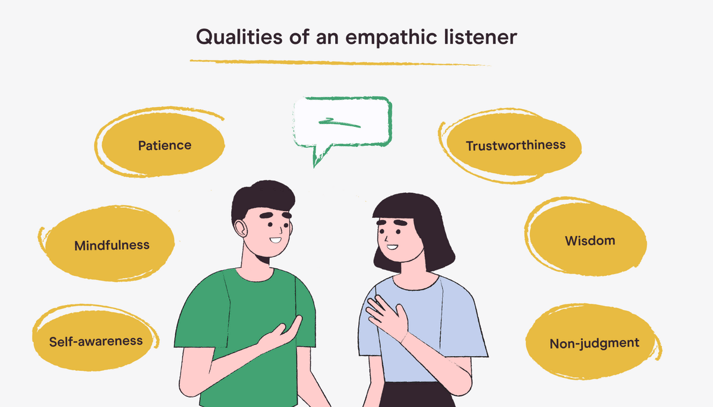In this fallen world, it’s guaranteed that you know, have known, or will know someone who’s hurting. Maybe it’s a physical hurt — an acute sickness, injury, or chronic illness. Maybe it’s an emotional hurt — a loss, rejection, or broken heart.
Or maybe, like the biblical patriarch Job, it’s a combination of both. The first two chapters of the book describe a series of extremely traumatic events which destroyed everything Job owned, killed his sons and daughters, and left him in debilitating health. Hurt upon hurt upon hurt.
Perhaps you know someone who’s walking through something horrifically Job-like right now. A dire diagnosis. A financial crisis. An unexpected death. A life-shattering divorce. Hurt upon hurt.
What’s a person to do when faced with that much pain in the life of someone we care about? Job had a couple of friends who can help us answer that question.
Show up

At first, Job’s friends got the whole ministering-to-the-hurting thing really right. Job 2:11 says, “…and they made an appointment together to come to sympathize with him and comfort him.” They came. No strings, no expectations. They just showed up.
Some people’s natural tendency is to back off when someone they know is suffering. Not knowing what to do, they opt to do nothing at all. I’ve been that person, honestly. The one who thinks a suffering acquaintance needs their space and convinces herself that there’s nothing to be done.
That’s false. There’s always a way to show up for the hurting. A phone call. A text or an email. A card or a meal. An extended, scheduled visit to take care of household duties. A drop-by with flowers, no strings or expectations attached.
During a personal crisis last fall, I had a friend who would call every couple of days to check in. If I couldn’t answer, she’d leave a voicemail: “Hey, don’t feel any pressure to call me back. I just wanted you to know I love you.” She showed up. And for the price of a smile, her voice helped me not hurt so much.
Cry and be quiet
Job 2:12-13 goes on to say that Job’s friends wept on his behalf, then sat quietly with him for seven days and nights. They were probably performing the Jewish custom of holding (or sitting) shiva, a practice of mourning next to someone in silence after a great loss.
Perhaps we would do well to informally hold shiva for the hurting people in our lives. Holding shiva isn’t avoiding the hurt because you don’t know what to say. It’s showing up, crying, and acknowledging that often there are no adequate words for pain. How beautiful.
Unfortunately, sitting shiva is the last good thing that Job’s friends do. But, we can still learn from the negative, that is, learn what to do for hurting friends from their example of what not to do. Let’s continue on…
Listen with empathy
After the seven days, Job opens up with a lament. All of chapter three is basically him saying, “Oh my gosh, this is the worst. I can’t believe this is happening. This hurts so bad; I wish I was never born.”
Okay, so that may be a bit gloomy of Job to say out loud. But for goodness’ sake, the man had just lost literally everything, and he thought he was in the presence of friends. Who among us hasn’t vented a little to our besties?
At this point, Job’s friends launched into their lectures. But what they should’ve done was stop and practice some empathetic listening before saying anything else. Empathetic listening is an active form of listening which intends to connect with the speaker on an emotional level.
My mental health counselor is really awesome at empathetic listening. After I say something, she will rephrase what I’ve said verbally with something like, “I heard you say _____.” That’s active listening. Then she will show that she’s observed me beyond my words — my tone, demeanor, body language, expression — with something like, “It seems like you’re feeling _____. Is that accurate?” That’s empathetic listening.
Active listening: “I heard you say _____.”
Empathetic listening: “It seems like you’re feeling _____. Is that accurate?”

(Source: Pareto Labs)
Ask instead of assuming
The bulk of the book of Job continues with his friends showing us more of what not to do. In turn, they each made it clear: They assumed that Job somehow brought this suffering upon himself. Over and over, they accuse him of sinning, either in secret or unknowingly, because what else (in their minds) could cause such catastrophic trauma in his life?
Because of this, Job was forced to defend himself while he was still suffering. Talk about adding insult to injury. Even though Job’s life had been the model of integrity, the friends couldn’t get past their assumptions that the innocent don’t suffer and the wicked do.
I can tell you from experience that making assumptions — or even hinting at them — adds extra hurt to those who are suffering. During the early stages of the season I mentioned above, I had a friend who jumped in with comments that made me feel as if I brought the hurt upon myself, as if I had done the wrong things or hadn’t done enough. Having to defend myself against false assumptions didn’t feel great, that’s for sure.
In my opinion, it would’ve been much kinder of Job’s friends to ask compassionate questions. I have another friend who chose this approach on the very same day. Instead of coming into a conversation with assumptions, she asked great questions with one common theme: Understanding. She didn’t assume to know anything about the hurt or how to fix it; she simply wanted to understand what I was going through. In the process, she helped me feel seen and cared for — balm for a hurting person.
Now, there are absolutely times when people do bring suffering upon themselves, due to sin or poor choices. But we know that in Job’s case this wasn’t true; calamity came upon him while he was “blameless.” My point is this: don’t assume you know the cause of your friend’s suffering; seek to understand instead.
Choose prayer over platitudes
In addition to having his source of suffering all figured out, Job’s friends also thought they knew exactly how to get him out of it. “Here’s what you gotta do,” they said. “Confess and be blessed. Believe and receive. Trust us, bro, just let go and let God, and everything will work out for good.”
Of course, that’s all paraphrased, but here’s the point: Job’s friends went on to say a bunch of stuff that sounded … sorta good. They made okay points about the importance of repentance and God judging wickedness. The problem was, none of that really applied to or “fixed” Job’s situation.
In an age of cutesy Christian t-shirts and wooden signs, I think it’s easy for us to fall into the same trap with hurting friends. It’s easy for us to quote platitudes like, “Everything happens for a reason,” “Prayer changes things,” and “With God, all things are possible” with really good intentions. They sound super good.
The problem is that while biblical, they don’t always apply. Because the Christian life never boils down neatly to a phrase that can be printed on a plaque. It’s as messy and unique and unpredictable as the people who live it. Yes, God has things in control, yes, He hears our prayers, and yes, He’s sovereign.
But for the person who’s been praying for weeks, months, years to a God she 100% believes is sovereign and works for her good? Well, that hurting person doesn’t need a t-shirt. A nice-sounding catchphrase isn’t going to fix anything for her. She needs a prayer warrior. She needs a friend who will ditch the Christian verbiage she’s heard a million times and instead say, “What you’re going through really stinks. How can I pray with you?”
Consider forms of practical help

Wouldn’t it have been nice if Job’s friends had asked him if he needed help with, oh, I don’t know, rebuilding his fences? Maybe offered him a pair of sheep or a camel? They could’ve volunteered to make a run to get him boil ointment, surely.
Let that be a lesson to us all. There’s always something — however seemingly small — to do for the hurting. Sure, maybe we can’t replace 7,000 sheep and 500 oxen (or whatever that is in modern-day terms). But we could have pizza delivered for a sick family or leave a few homemade cookies on the doorstep of that single friend going through a breakup. We could help a widower neighbor get ready for storm season or offer to handle sports pick-ups for the mama going through treatment. Look for ways to practically make a difference; it means more than you know.
Don’t pretend to know God’s will
Finally — and most importantly — whatever you do for the hurting person in your life, DO NOT act like you know what God’s will is for their life. Because you don’t.
That’s the whole point of the book of Job, actually. When God speaks to Job at the end of the book, He doesn’t defend His ways or explain the “whys.” Instead, He reminds Job that He runs the universe the way He sees fit. He does what He does and doesn’t owe anyone any explanation. He doesn’t even say, “Sorry, Job, this was a test.” No. He says that Job will never, ever understand His ways. No one will.
So, when ministering to hurting friends, it’s important that we don’t act like we know God’s ways or His will. Practically speaking, that means: take great care when quoting Scripture to hurting friends.
It’s easy to point to the woman healed of her bleeding and ignore Paul never getting relief from his thorn in the flesh. It’s nice to quote the time God saved Shadrach, Meshach, and Abednego from the fire and leave out the times when Christian martyrs were burned at the stake. It’s comforting to remember the parting of the Red Sea and forget that God, in His sovereignty, allowed His people to die in slavery for 400 years before that.
We cannot predict what God is doing in the lives of our friends. So be very slow to speak on God’s behalf, lest, like Job’s friends, He says, “You have not spoken of me what is right” (Job 42:7).
And if in doubt about what to say, we can always rely on the words of Job (after all, his words were approved by God in the end): “The Lord gives and the Lord takes away, blessed be the name of the Lord.” Job knew that no matter what, God is good and worthy of worship, even when (or rather, especially when) we don’t understand His ways.
Conclusion
Let us not underestimate the importance and impact of being present, being available, and being prayer warriors for our hurting friends. In learning from what not to do, we are better equipped to be a friend who “loveth at all times” (Proverbs 17:17).






